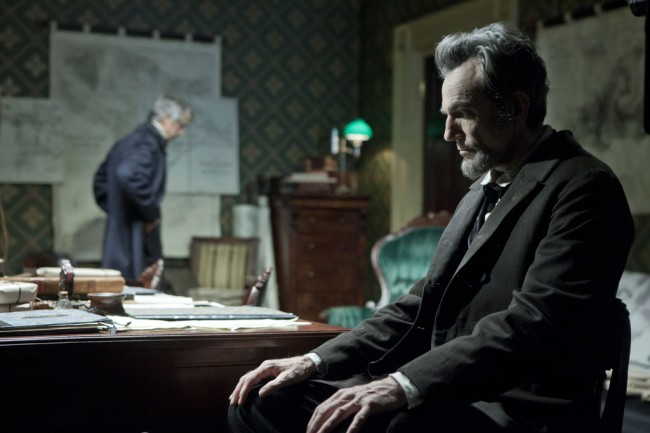Lincoln
James Spader Dons Arcane Mustache; Day-Lewis Barks

Review written by Robert Patrick
Starring: Daniel Day-Lewis, Sally Field
Abe Lincoln is always portrayed as a sentient block of wood. Here, in Spielberg’s take on the lionized president, he remains intrepid and warmly enigmatic. Daniel Day-Lewis’ voice crackles like a bed of embers as his wiry, tall frame slinks around from office to house. Day-Lewis’ portrayal of the president is a lanky, creaking and seemingly frail one. Beam-like in stature and dolloped with a his trademark hat, Spielberg’s interpretation of Lincoln is a seesaw of lore and of humanity. The late-president was a stony, unwavering representation of calm and unflappable certainty, the movie asserts, while he also carried a maimed heart that achingly palpitated for his ailing family. A portrait always half-painted, honest Abe, here more than not, is an old, ambling lion with a weary mane.
Spielberg’s film is a long, sometimes cumbersome, retelling of Lincoln’s incendiary battle with a stubborn, emotionally frugal house of representatives in his bid to free slaves. One of the most wordy and verbose pictures of the year, Lincoln rattles and skips with thorny retorts and volatile zingers that would make Howard Hawks do a double take. Think Aaron Sorkin channeling Shelby Foote. For a major studio film, Lincoln will test the patience of many audiences with its voluminous and pastoral liking for flowery words. The action is regulated to a few spry skirmishes, in the beginning of the film, while the central nervous system of the movie revolves around fiery and animated political exchanges.
Even though Spielberg cant keep his hands out of the honey jar – scenes are blackjacked by his need for syrupy whimsy – there are great performances in the film, anchored by the chameleon-like Day-Lewis and James Spader’s turn as a smarmy, guffawing Democratic operative named William N. Bilboe. Some may cite Sally Field’s portrayal of the bedraggled and emotionally mercurial Mary Todd Lincoln to be of note, but she is basically, once again, playing Peter Parker’s aunt Mae from this year’s The Amazing Spider-Man.
The ending of Lincoln wheezes and halts, taking away from the teeth-gnashing political jousting of the first few hours, by making the finale too maudlin and heartfelt; too annoyingly hokey. Spielberg cant evade his own warming glow and hugs his own movie so tight that the wheels virtually pop off of the thing. Lincoln works best when Day-Lewis is allowed to chisel the words of Tony Kushner’s script with his hoarse delivery, James Spader is given the green light to bob about like a bourbon soaked buoy, and Tommy Lee Jones is free to glower and preach.
Lincoln will be pelted with Academy Award nominations – no surprise here, I’m sure you’ll agree – but out of the cavalcade of talent that the movie amasses, the one nod it deserves to get will be a best supporting actor nomination for Tommy Lee Jones. The baritone howl of the venerable actor has never seemed more incensed and proud. Lincoln made stand in its own way, but if you do your own editing, you’ll find yourself to be pleased – especially Civil War enthusiasts (watch out for a fleeting glimpse of Dan Sickles’ amputated leg).
